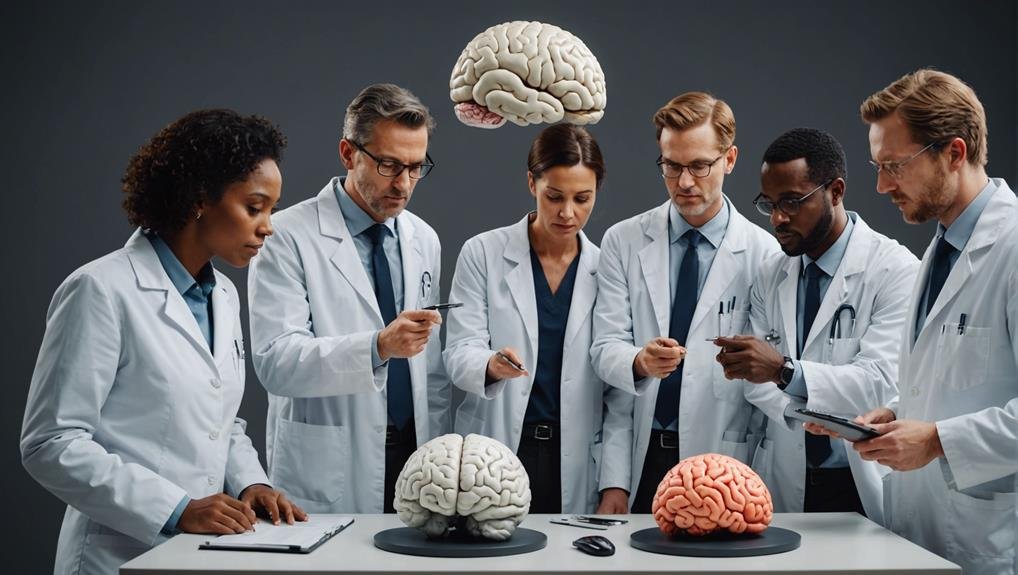Health Experts Unveil Stroke Insights
In the domain of healthcare, recent revelations from health experts have shed light on critical insights into strokes, encompassing a spectrum from causes to recovery. The disclosure of these findings piques curiosity about the groundbreaking strategies poised to transform stroke management. Understanding the intricacies of stroke prevention and prompt intervention represents a pivotal stride towards enhancing health outcomes and fostering a culture of informed decision-making. Such revelations hold immense potential to revolutionize the landscape of stroke care, prompting a closer examination of the implications for both individuals and public health initiatives.
Key Takeaways
- Neuroplasticity benefits aid in brain reorganization for stroke recovery.
- Prompt recognition of stroke symptoms is crucial for immediate medical intervention.
- Lifestyle changes, like exercise and a healthy diet, are key in stroke prevention.
- Effective rehabilitation programs offer tailored interventions for stroke recovery.
- Understanding stroke causes and risk factors can help prevent strokes.
Stroke Causes and Risk Factors
What are the primary causes and risk factors associated with strokes?
Strokes can be triggered by various factors, including blood clots obstructing brain arteries (thrombotic stroke), debris or clots from elsewhere blocking brain arteries (embolic stroke), or the rupture of a blood vessel in the brain (hemorrhagic stroke). Understanding these causes is important for preventing complications and improving prognosis post-stroke.
Risk factors such as high blood pressure, diabetes, high cholesterol, smoking, and excessive alcohol consumption can increase the likelihood of a stroke. Managing these risk factors through lifestyle changes, regular exercise, and a healthy diet is crucial in reducing the chances of experiencing a stroke.
Seeking medical advice for conditions that heighten stroke risk is essential in ensuring early intervention and a better prognosis.
Recognizing Stroke Symptoms
Recognizing the signs of a stroke is essential for prompt medical intervention and better outcomes. Early detection of stroke symptoms can have a profound impact on the treatment and recovery process. It is important to be aware of the warning signs that may indicate a stroke is occurring. Common symptoms include sudden numbness or weakness in the face, arm, or leg, especially on one side of the body, confusion, trouble speaking or understanding speech, difficulty seeing in one or both eyes, dizziness, loss of balance or coordination, and severe headache without a known cause. If any of these signs are present, seeking immediate medical attention is crucial for proper evaluation and intervention.
| Warning Signs of Stroke | Description |
|---|---|
| Sudden numbness or weakness | Typically on one side of the body |
| Confusion | Difficulty with understanding or speaking |
| Trouble seeing | Vision problems in one or both eyes |
| Severe headache | Without a known cause |
Importance of Prompt Medical Intervention
The timely administration of medical care is essential in the management of stroke cases. Emergency response and treatment urgency play pivotal roles in determining the outcome for stroke patients. Prompt medical intervention can greatly impact the degree of recovery and reduce the risk of long-term disabilities.
When dealing with stroke cases, every minute counts, and swift action can save lives. It is imperative for individuals to recognize the signs of a stroke and seek immediate medical attention to maximize the best chances of recovery.
Healthcare providers need to be well-prepared to deliver rapid and effective treatment to minimize the damage caused by a stroke event.
Strategies for Stroke Recovery
In the field of stroke management, moving from acute intervention to effective long-term recovery strategies is essential for optimizing patient outcomes. Neuroplasticity benefits play an important role in stroke recovery by enabling the brain to reorganize and form new neural connections.
Cognitive exercises are integral components of rehabilitation post-stroke, focusing on improving memory, attention, and problem-solving skills. These exercises stimulate brain function and promote recovery by engaging various cognitive processes. By harnessing neuroplasticity benefits through targeted cognitive exercises, stroke survivors can enhance their cognitive abilities and regain lost functions.
Incorporating these strategies into a thorough rehabilitation program can greatly improve the quality of life for individuals recovering from a stroke, emphasizing the importance of ongoing support and tailored interventions.
Key Steps in Stroke Prevention
Understanding the key steps in stroke prevention is crucial for reducing the risk of this debilitating condition. To lower the likelihood of experiencing a stroke, individuals can take the following proactive measures:
- Maintain a Healthy Lifestyle: Engage in regular physical activity, manage stress levels, and guarantee an adequate amount of sleep.
- Make Smart Dietary Choices: Consume a balanced diet rich in fruits, vegetables, whole grains, lean proteins, and healthy fats.
- Avoid Risky Habits: Steer clear of smoking and excessive alcohol consumption to decrease the chances of a stroke occurrence.
Conclusion
To sum up, the revelation of vital stroke insights highlights the importance of proactive measures in stroke prevention and treatment.
By comprehending the causes, symptoms, and recovery strategies associated with strokes, individuals can take steps to reduce their risk and improve their overall health outcomes.
Like a guiding light in a sea of uncertainty, this knowledge empowers individuals to make informed choices and prioritize their well-being.







